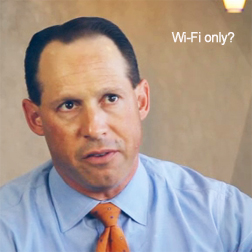"We try to look for all the opportunities in the world to get the OEMs to understand that they shouldn’t be building two devices," he said in the All Things D interview. "They should be building one device with Wi-Fi and 4G. It’s more efficient for them than having two [product] lines."
He believes it is a simple matter of education. Consumers must learn that they need always-on connectivity, he said. Naturally, eliminating Wi-Fi only would serve AT&T too. More connections means more subscribers and more subscribers means a better revenue model if they choose AT&T.
I appreciate his candor, but the comments immediately following the story tell another story. Even with the best of intentions, Lurie is out of touch with the customer. People see subscriptions as traps.
Understanding the consumer mindset and product usage.
It really isn't that hard to understand. People opt for Wi-Fi only iPads and tablets so they don't have to pay for another cellular subscription. Many of them believe the phone subscription is enough.
From the consumer perspective, it makes sense. It even has an historic context. The number one reason that newspaper and magazine subscriptions dwindled is because people are genuinely tired of subscriptions that eventually begin to feel like utilities — fees you have to pay for the basic services.
Among monthly fees, publications are frequently the first to go. Especially if your income is unstable (tip workers, etc.), elective subscriptions go twice as fast. So you have to pick and choose from a long list of fundamental and elective expenses.
For most people, mandatories include: electric, gas, water, municipal services, mortgage payments, car leases or payments, car insurance, telecommunications, mobile telecommunications, cable or satellite, and taxes. Now add health insurance (especially with new government requirements) and life insurance. Immediately following those payments are the electives, ranging from gamer accounts and clubs to gym memberships and lawn care. All of them cause a dwindling supply of disposable income.
 Where do iPads and tablets fit? For many but not all consumers, it's closer to the bottom because those who opt for Wi-Fi only are satisfied with using their smart phones when they are on the go and Wi-Fi only when they have access at home, work, the hotel, and a growing number of other venues (both public and private hot spots). In fact, given how many places are adding Wi-Fi and AT&T's support of such hot spots to cut down on system overload, it seems more likely Wi-Fi is preferred (doubly so because some functions require Wi-Fi access to work). All things considered, why pay more?
Where do iPads and tablets fit? For many but not all consumers, it's closer to the bottom because those who opt for Wi-Fi only are satisfied with using their smart phones when they are on the go and Wi-Fi only when they have access at home, work, the hotel, and a growing number of other venues (both public and private hot spots). In fact, given how many places are adding Wi-Fi and AT&T's support of such hot spots to cut down on system overload, it seems more likely Wi-Fi is preferred (doubly so because some functions require Wi-Fi access to work). All things considered, why pay more?Obviously, some people do have a need. The split between the products is generally 60 percent Wi-Fi only and 40 percent 4G. The slight advantage Wi-Fi has is a lower model price and no subscription fee after you purchase the product. But there is even more to the story.
AT&T and other providers have contributed to Wi-Fi only sales with usage throttling, data usage caps, service issues, roaming charges, high overage changes, etc. Maybe it's not the consumer who needs to be educated. AT&T could learn something about consumers and make 4G more tempting.
Making a better future to marry Wi-Fi and 4G.
I'm not one of the many people who equate AT&T with the evil empire. I genuinely prefer them as my phone provider, think they have better customer service, and they recently did us right by offering advice on how to handle our phone service (for three phones) while traveling in a foreign country.
So how do carriers sell always-on connectivity? For starters, they could break away from device subscription models and replace them with account subscriptions instead. If you already have an iPhone, your iPad subscription is, gasp, inclusive because you're less likely to use both at the same time.
Or, they could implement lifetime plans built into the product price much like they did for Amazon Kindle (with a better fallback for usage overages). Or, they could give people the option of buying 4G-ready devices without a subscription, allowing them to add it (or drop it) at their leisure.
Of course, they could improve their system so it isn't affected by high-usage customers (thereby killing the throttle concept). And, if they are among those who want to regulate Internet traffic and bandwidths, they could give it up and stay focused on their core service to provide a better experience.
Simply put, it's not education that consumers need. They need an incentive, especially those who get along fine without 4G connectivity, using their iPad mostly around their already Wi-Fi friendly home.
Remember. AT&T is pushing "Think Possible." And right now, people think Wi-Fi everywhere, which is a better fit with Steve Jobs's old vision to make a contribution to the world by making tools for the mind that advance humankind. Something like that makes subscriptions optional.


















